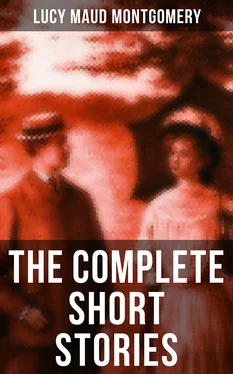“I suppose so,” he answered lamely.
“And what about me?” asked Tannis.
When you come to think of it, this was an embarrassing question, especially for Carey, who had believed that Tannis understood the game, and played it for its own sake, as he did.
“I don’t understand you, Tannis,” he said hurriedly.
“You have made me love you,” said Tannis.
The words sound flat enough on paper. They did not sound flat to Tom, as repeated by Lazarre, and they sounded anything but flat to Carey, hurled at him as they were by a woman trembling with all the passions of her savage ancestry. Tannis had justified her criticism of poetry. She had said her half-dozen words, instinct with all the despair and pain and wild appeal that all the poetry in the world had ever expressed.
They made Carey feel like a scoundrel. All at once he realized how impossible it would be to explain matters to Tannis, and that he would make a still bigger fool of himself, if he tried.
“I am very sorry,” he stammered, like a whipped schoolboy.
“It is no matter,” interrupted Tannis violently. “What difference does it make about me — a half-breed girl? We breed girls are only born to amuse the white men. That is so — is it not? Then, when they are tired of us, they push us aside and go back to their own kind. Oh, it is very well. But I will not forget — my father and brother will not forget. They will make you sorry to some purpose!”
She turned, and stalked away to her canoe. He waited under the pines until she crossed the river; then he, too, went miserably home. What a mess he had contrived to make of things! Poor Tannis! How handsome she had looked in her fury — and how much like a squaw! The racial marks always come out plainly under the stress of emotion, as Tom noted later.
Her threat did not disturb him. If young Paul and old Auguste made things unpleasant for him, he thought himself more than a match for them. It was the thought of the suffering he had brought upon Tannis that worried him. He had not, to be sure, been a villain; but he had been a fool, and that is almost as bad, under some circumstances.
The Dumonts, however, did not trouble him. After all, Tannis’ four years in Prince Albert had not been altogether wasted. She knew that white girls did not mix their male relatives up in a vendetta when a man ceased calling on them — and she had nothing else to complain of that could be put in words. After some reflection she concluded to hold her tongue. She even laughed when old Auguste asked her what was up between her and her fellow, and said she had grown tired of him. Old Auguste shrugged his shoulders resignedly. It was just as well, maybe. Those English sons-in-law sometimes gave themselves too many airs.
So Carey rode often to town and Tannis bided her time, and plotted futile schemes of revenge, and Lazarre Mérimée scowled and got drunk — and life went on at the Flats as usual, until the last week in October, when a big wind and rainstorm swept over the northland.
It was a bad night. The wires were down between the Flats and Prince Albert and all communication with the outside world was cut off. Over at Joe Esquint’s the breeds were having a carouse in honor of Joe’s birthday. Paul Dumont had gone over, and Carey was alone in the office, smoking lazily and dreaming of Elinor.
Suddenly, above the plash of rain and whistle of wind, he heard outcries in the street. Running to the door he was met by Mrs. Joe Esquint, who grasped him breathlessly.
“Meestair Carey — come quick! Lazarre, he kill Paul — they fight!”
Carey, with a smothered oath, rushed across the street. He had been afraid of something of the sort, and had advised Paul not to go, for those half-breed carouses almost always ended in a free fight. He burst into the kitchen at Joe Esquint’s, to find a circle of mute spectators ranged around the room and Paul and Lazarre in a clinch in the center. Carey was relieved to find it was only an affair of fists. He promptly hurled himself at the combatants and dragged Paul away, while Mrs. Joe Esquint — Joe himself being dead-drunk in a corner — flung her fat arms about Lazarre and held him back.
“Stop this,” said Carey sternly.
“Let me get at him,” foamed Paul. “He insulted my sister. He said that you — let me get at him!”
He could not writhe free from Carey’s iron grip. Lazarre, with a snarl like a wolf, sent Mrs. Joe spinning, and rushed at Paul. Carey struck out as best he could, and Lazarre went reeling back against the table. It went over with a crash and the light went out!
Mrs. Joe’s shrieks might have brought the roof down. In the confusion that ensued, two pistol shots rang out sharply. There was a cry, a groan, a fall — then a rush for the door. When Mrs. Joe Esquint’s sister-in-law, Marie, dashed in with another lamp, Mrs. Joe was still shrieking, Paul Dumont was leaning sickly against the wall with a dangling arm, and Carey lay face downward on the floor, with blood trickling from under him.
Marie Esquint was a woman of nerve. She told Mrs. Joe to shut up, and she turned Carey over. He was conscious, but seemed dazed and could not help himself. Marie put a coat under his head, told Paul to lie down on the bench, ordered Mrs. Joe to get a bed ready, and went for the doctor. It happened that there was a doctor at the Flats that night — a Prince Albert man who had been up at the Reservation, fixing up some sick Indians, and had been stormstaid at old Auguste’s on his way back.
Marie soon returned with the doctor, old Auguste, and Tannis. Carey was carried in and laid on Mrs. Esquint’s bed. The doctor made a brief examination, while Mrs. Joe sat on the floor and howled at the top of her lungs. Then he shook his head.
“Shot in the back,” he said briefly.
“How long?” asked Carey, understanding.
“Perhaps till morning,” answered the doctor. Mrs. Joe gave a louder howl than ever at this, and Tannis came and stood by the bed. The doctor, knowing that he could do nothing for Carey, hurried into the kitchen to attend to Paul, who had a badly shattered arm, and Marie went with him.
Carey looked stupidly at Tannis.
“Send for her,” he said.
Tannis smiled cruelly.
“There is no way. The wires are down, and there is no man at the
Flats who will go to town tonight,” she answered.
“My God, I MUST see her before I die,” burst out Carey pleadingly. “Where is Father Gabriel? HE will go.”
“The priest went to town last night and has not come back,” said
Tannis.
Carey groaned and shut his eyes. If Father Gabriel was away, there was indeed no one to go. Old Auguste and the doctor could not leave Paul and he knew well that no breed of them all at the Flats would turn out on such a night, even if they were not, one and all, mortally scared of being mixed up in the law and justice that would be sure to follow the affair. He must die without seeing Elinor.
Tannis looked inscrutably down on the pale face on Mrs. Joe Esquint’s dirty pillows. Her immobile features gave no sign of the conflict raging within her. After a short space she turned and went out, shutting the door softly on the wounded man and Mrs. Joe, whose howls had now simmered down to whines. In the next room, Paul was crying out with pain as the doctor worked on his arm, but Tannis did not go to him. Instead, she slipped out and hurried down the stormy street to old Auguste’s stable. Five minutes later she was galloping down the black, wind-lashed river trail, on her way to town, to bring Elinor Blair to her lover’s deathbed.
I hold that no woman ever did anything more unselfish than this deed of Tannis! For the sake of love she put under her feet the jealousy and hatred that had clamored at her heart. She held, not only revenge, but the dearer joy of watching by Carey to the last, in the hollow of her hand, and she cast both away that the man she loved might draw his dying breath somewhat easier. In a white woman the deed would have been merely commendable. In Tannis of the Flats, with her ancestry and tradition, it was lofty self-sacrifice.
Читать дальше












